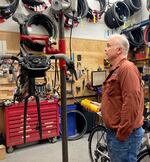Editor’s note: As President Donald Trump takes office, OPB is providing a look over the week surrounding inauguration to understand how Oregonians voted, how they’re feeling now and how the new administration could affect Northwest communities through top issues like immigration, tariffs, criminal justice and the I-5 bridge replacement.

A person rides an e-bike in Vancouver, Wash., on June 29, 2024. The majority of e-bikes are manufactured in China, they would be subject to tariffs endorsed by President Donald Trump.
Anna Lueck / OPB
Wakefield Gregg spent last summer worried slumping sales at his electric bike store in North Portland could lead to layoffs.
The eBike Store, a pioneer in Portland e-bike shops, started last year with a glut of inventory. At the same time, local stores were increasingly competing with big retailers getting into the e-bike game.
Gregg, who founded the retail and repair shop in 2008, was concerned all those things would shrink his business.
“And then November hit,” Gregg said while one of his mechanics hoisted an e-bike onto a repair station behind him, “and boom.”
Since the election, sales are up 25% over his previous forecast.
“Causation, as we know, is really difficult to say definitively,” Gregg said. “But I really believe people are being driven by the possible tariffs coming down the pipe.”
Since all electric bikes contain components made in other countries, and the majority of e-bikes are manufactured in China, they’re a likely target for tariffs endorsed by President Donald Trump.

The eBike Store founder and owner Wakefield Gregg in the store's repair shop on Jan. 13, 2025 in Portland, Ore. Electric bikes are among the imports that would be impacted by tariffs proposed by President Trump. Gregg says since the election sales are up thanks in part to customers purchasing e-bikes before potential tariffs can raise prices.
Kyra Buckley / OPB
Potential tariffs — taxes on imported items — could raise prices on a wide range of consumer goods, and in anticipation Oregonians have been upgrading cars, cellphones and bicycles.
Meanwhile, economists warn that if the federal government enacts widespread tariffs, businesses and consumers should prepare for retaliatory measures from global trading partners. Any backlash could especially hurt Oregon, a trade-dependent state that exported more than $25 billion worth of goods in 2023.
Inflation warning
In his first term, Trump implemented specific tariffs on things like solar panels and washing machines. In his second term, he has vowed to levy blanket tariffs on imported goods coming into the U.S. and targeted tariffs on certain countries, namely China.
The majority of consumer goods sold in the U.S. are either imported or have components that are, from cellphones, tablets and other electronics to medications, clothes, shoes, cars and car parts. In Oregon, major imports include fuels, fertilizers and furniture.
Related: Trump says 25% tariffs on Canada and Mexico are coming Feb. 1
Trump has said tariffs will increase domestic manufacturing, lower prices and spur economic development in the country. The president’s pick for secretary of the Treasury, Scott Bessent, told lawmakers tariffs will help American workers without contributing to inflation during his confirmation hearing last week.
“And as we rebuild our economy and lay the foundation for the next generation of American competitiveness, we must use all the tools available to realign the international economic system to better serve the interests of working Americans,” Bessent said in the hearing. “For too long, our nation has allowed unfair distortions in the international trading system.”
Economists warn the move will do the opposite while inviting retaliation from global trading partners.
“If I tax a business right here in town, that business is not going to eat all of that,” said Bahram Adrangi, economics professor at the University of Portland. “It’s going to try to pass it on to consumers as much as they can. Tariffs are no different, and if you slap tariffs on things, they’re going to ultimately reflect themselves in prices that we pay.”
He says prices could go up 20% to 40% across the board on imported goods. That will hurt efforts to keep inflation in check and will eat into family budgets.
“What that means is, as little as savings are today,” Adrangi said, “savings will be even much further squeezed out.”
Adrangi pointed out that tariffs will also hit components used in manufacturing, and could end up negatively affecting U.S. workers if companies decide to slow down production or move overseas. And globally the move could damage already tense relationships between countries, inviting retaliatory tariffs that would hurt U.S. exporters.

FILE - iPhone 15 Pro phones are shown during an announcement of new products on the Apple campus in Cupertino, Calif., Sept. 12, 2023. Tariffs proposed by President Trump would impact cell phones, tablets and other electronics that are made with overseas components.
Jeff Chiu / AP
Oregonians prepare
OPB heard from more than a dozen people who described making large purchases ahead of Inauguration Day, citing concerns that prices would go up if tariffs are enacted.
Several people said they decided to buy or upgrade cellphones, tablets, other electronics, cars and home equipment in the face of potential price increases.
“We have been on the fence about replacing the HVAC in our house,” Troutdale resident Kevin Keef wrote. “While we would have liked to have put it off a little longer, we decided things probably weren’t going to get cheaper with time.”
Back at the eBike Store, Gregg said he’s hearing from customers that have wanted to invest in an electric bike for a long time. The election motivated them to go through with it.
“It was just surprising,” he said. “It’s one of those things you shake your head and go, ‘I do not understand the way this current is moving me.’ I’m not against it by any stretch, but it’s just different. I wasn’t expecting it at all.”
What he is expecting is that the current boom will help alleviate the glut of supply his and other e-bike stores amassed last year. When he does order more from his suppliers, Gregg is prepared to pay more if tariffs are implemented.

Mechanics at The eBike Store, Mark Winningkoff and service manager Jefferson Hunt, work at the shop on Jan. 13, 2025 in Portland, Ore. Electric bikes are among the imports that would be impacted by tariffs proposed by President Trump. Sales are up at The eBike Store thanks in part to customers purchasing e-bikes before potential tariffs can raise prices.
Kyra Buckley / OPB
Bob Margevicius is an executive vice president at Specialized Bicycle Components, a global bicycle design and manufacturing company. He’s spent nearly five decades in the bicycle industry and represents Specialized on various global trade and sporting goods associations.
Margevicius said while tariffs could raise prices in some markets, his company will see little impact because it sells bikes all over the world, not just in the U.S. But if the U.S. does implement tariffs, Margevicius said he’s watching to see if there’s any retaliation from trading partners.
“There’s been a lot of rhetoric out there about how other countries are going to respond,” Margevicius said. “That probably will be the most interesting thing to watch is just how other countries behave, how they react, and does it cause a change in the policies that the new administration is going to bring into play.”
In the meantime, he said, companies and consumers alike are going to be learning how to operate in a changing economy.
“All of us are going to be impacted,” Margevicius said. “We’re all in it together, and we’re just going to have to navigate it as these situations happen and try and find the best outcomes and conclusions.”
